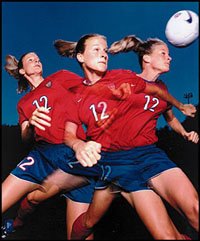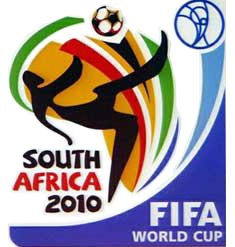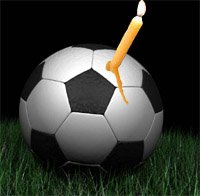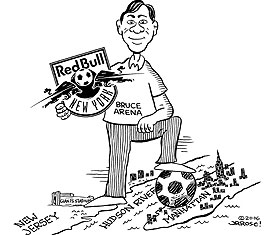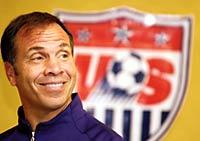This post is part of the 'Third Carnival of American Soccer Blogs' as hosted by Zathras at
The Fool's Prerogative.
----
With a month now gone between the German experience and today, it is time to turn our eyes to 2010 and how we move the men's team forward?
The first thing that must be answered is who will coach our men's team. Most of the talk has been about Jürgen Klinsmann. He was a fantastic player who took part in the biggest games. The experience he can bring to the team is like nothing that the US has ever before seen. He is familiar with the US system having lived here for a number of years, so he should understand the mindset of the American player and he used American techniques to change the German team around. However, the biggest plus for Klinsmann is the attention, both in terms of media and international respect, he would bring the team. Klinsmann would give the US media a story through which to tell the US story and might help land bigger teams for international dates.
Still there are downsides. He might know the US mindset, but he has never played/coached in the MLS or CONCACAF. He might have used American techniques to change Germany, but one must still remember, the were still Germany. Also, with all the attention focused on him, it might keep players from becoming known. Finally, I worry that with all the faith most of us are ready to put into Klinsmann, he will not be challenged on the decisions he makes. No coach is right all the time and when a coach is wrong, he needs to be called on it.
So if not Klinsmann then who?
A person I at first pooh-poohed but now am starting to think might be a good move is Frank Yallop. Yallop has played and coached in the MLS and CONCACAF. His knowledge of the US game is evident in his successful run with San Jose. As coach of Canada, he was not able to move the mountain and get them to the World Cup (or even the final stage of CONCACAF qualifying), but he did improve their game.
Yallop would not become the story as Klinsmann would, since no one in the media would really be talking about the excitement that is Yallop. However, he might just be able to string together a team that could challenge in a big way in 2010.
The other person I think would help out the US is Peter Nowak. Like Yallop, he has played and coached in the MLS and has a good record. He would bring intensity to the game that could re-fire the US furnace. One problem, he does not have any international experience, but then again, neither did Klinsmann before Germany.
These three would bring different things to the team. Klinsmann would focus on a more attacking style, Yallop could mean Donovan's role in the team would continue to be large and Nowak might just focus on a solid midfield.
All three of these directions could bring us to something fascinating. Klinsmann would still be my first choice, but Yallop is a close second.
But the coach alone will not make the team. A great coach can do a lot, but if the players are not up to it, the team will fail.
For the players to come together they need to face big tests and some of them need to be outside of the US. Over the next four years the US should hold at least three camps not on US soil. It would be great if these camps ended with play against teams like England, Brazil, France, etc, but taking on teams like Australia, South Africa and Russia would also be a fine test.
Going along with this point, the US should accept every invitation to Copa América they are offered. Find a work around for any problems and get the men down South.
Okay, play more games in harder locations against good teams, not the most unique of ideas. However, there is one other big thing that should change, but US soccer has very little control over it: scheduling.
I'm not talking about the scheduling of US games or camps, but instead the scheduling of the MLS and NCAA soccer schedules.
The MLS needs to move to a Fall-Spring schedule in order to get in line with the rest of world soccer. Yes, this will mean that they will be competing with football and basketball, but the benefits would be big. The playoffs would not have to fight against college and pro football, players would not have to play in 90+ degree heat and MLS teams would have a better chance of performing well in international club competitions.
For the national team, this scheduling would make camps easier. No longer would we have camps with just MLS players, meaning that when the team was training, it would be the whole team training.
The biggest hurdle to making this happen is stadiums. MLS teams that do not own their own stadium, play on American football fields, thus scheduling in the fall becomes very difficult. However, next season will represent the first time that over half of MLS teams play in soccer specific stadiums. It might not happen within the next four years, but soon the schedule change will happen because it needs to happen.
The other schedule change needed is in the NCAA. Currently the college schedule only allows for about two-months of play consisting of about 20 games. There are chances of 10-15 more matches via various tournaments, but even with those games, the most meaningful games any college students play is 30-35 meaningful games a year. The strange thing is they have to do this in three-four months. That's about 10 matches a month. Anyway you look at it, that's a lot of matches meaning players don't have much time to recover if they get injured.
In Europe, young players generally play from September-May in about 40 matches. This schedule allows players more time to develop, more time to recover from injury and more chances to improve their game.
Now a big difference is in Europe, college is not where young players play. Still, if the NCAA adopted a six-month schedule and increased the number of games, players would become better. Better college players would improve the talent pool from which the national team can choose.
With college still the most common route for young players in America, if we do not use it to make our players the best they can be, how can we expect them to compete against the rest of the world?
If the US men want to truly become one of the big boys on the international soccer stage, they need to help make change happen. We can no longer pretend we are not part of the bigger soccer world. We need to adapt our game to their standards. If we do this, who knows, maybe when we host the World Cup in 2022, we will celebrate a win on home soil.
